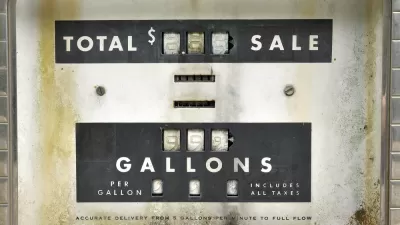In the wake of the decisive rejection of a ballot measure on August 5 to raise the state sales tax by .75% for a package of transportation improvements, how will the Missouri Department of Transportation (MoDOT) meet the state's transportation needs?
"Transportation officials had big plans for the nearly half-a-billion dollars a year [for 10 years] that would have been raised by a higher sales tax," writes KMOX reporter Brett Blume.
As noted here after the election, revenue was slated for 800 projects statewide, with 10 percent in the St. Louis region. Now MoDOT will use existing revenue for maintenance, according to Greg Horn, St. Louis District Engineer for the Missouri Department of Transportation, who notes "that money will be depleted in three years unless new funding sources are found."
One of the major projects that would have been funded if Amendment 7 had passed was a complete rebuild of Interstate 270 in North County, one of the region’s oldest and most dilapidated corridors. Other projects put on hold include a new interchange at Interstates 70 and 170 and bus rapid transit for Metro.
"(L)awmakers will have to go back to the drawing board to figure out how to fix the state’s transportation infrastructure, most notably a plan to rebuild Interstate 70," writes Jason Hancock for The Kansas City Star.
One option they might consider is "going back to the legislature for a gas tax hike," favored by Tom Shrout with Missourians for Better Transportation Solutions, the group that opposed Amendment 7, according to a staff report by KMOX.
“I don’t know if it’s going to go that way or not, but it’s something that ought to be on the table and legislators ought to give serious consideration to it,” he says.
Considering that Missouri has the nation's 46th lowest gas tax at 17.30 cents [PDF] and it's been over 18 years since it was last increased, according to this chart from the Institute on Taxation and Economic Policy, Shrout's suggestion would appear to have merit.
St. Louis Mayor Francis G. Slay’s chief of staff, Jeff Rainford, apparently wasn't listening. "We’re kind of back to the drawing board in Missouri,” says Slay. “I don’t know that anybody has any bright ideas," he adds.
He says voters, along with not liking the sales tax, also don’t seem to like toll roads or gas taxes.
Results from a new AP-GfK poll confirm his opinion, though it dealt with federal, not state funding of transportation. Raising the gas tax, for example, received the least amount of support of the four options, only 14 percent. However, the most favored option, albeit with only 30 percent, was turning responsibility over to states, i.e. devolution, which judging by Tuesday's results, would not appear to work well in Missouri.
The other two options were a mileage-based user fee and having private companies build new roads and bridges and recouping their investment with tolls.
FULL STORY: After Failure of Amendment 7, MoDOT Figures Out What’s Nex

Study: Maui’s Plan to Convert Vacation Rentals to Long-Term Housing Could Cause Nearly $1 Billion Economic Loss
The plan would reduce visitor accommodation by 25,% resulting in 1,900 jobs lost.

North Texas Transit Leaders Tout Benefits of TOD for Growing Region
At a summit focused on transit-oriented development, policymakers discussed how North Texas’ expanded light rail system can serve as a tool for economic growth.

Why Should We Subsidize Public Transportation?
Many public transit agencies face financial stress due to rising costs, declining fare revenue, and declining subsidies. Transit advocates must provide a strong business case for increasing public transit funding.

How Community Science Connects People, Parks, and Biodiversity
Community science engages people of all backgrounds in documenting local biodiversity, strengthening connections to nature, and contributing to global efforts like the City Nature Challenge to build a more inclusive and resilient future.

Alabama: Trump Terminates Settlements for Black Communities Harmed By Raw Sewage
Trump deemed the landmark civil rights agreement “illegal DEI and environmental justice policy.”

Dear Tesla Driver: “It’s not You, It’s Him.”
Amidst a booming bumper sticker industry, one writer offers solace to those asking, “Does this car make me look fascist?”
Urban Design for Planners 1: Software Tools
This six-course series explores essential urban design concepts using open source software and equips planners with the tools they need to participate fully in the urban design process.
Planning for Universal Design
Learn the tools for implementing Universal Design in planning regulations.
City of Santa Clarita
Ascent Environmental
Institute for Housing and Urban Development Studies (IHS)
City of Grandview
Harvard GSD Executive Education
Toledo-Lucas County Plan Commissions
Salt Lake City
NYU Wagner Graduate School of Public Service



























